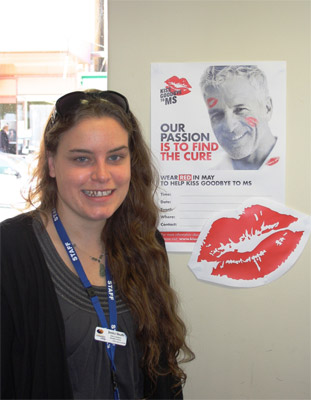Jessica Sheaffe AUBAGIO for Multiple Sclerosis Interview

Jessica Sheaffe AUBAGIO for Multiple Sclerosis Interview
AUBAGIO® (teriflunomide) 14mg, a new treatment option for people with multiple sclerosis (MS) has been registered by the TGA. AUBAGIO is indicated for patients with relapsing forms of MS to reduce the frequency of clinical relapses and to delay the progression of physical disability.
Professor Bill Carroll, Research Chairman of MS Research Australia, welcomed the availability of the new therapy saying, "It is important that the 23,000 people with MS living in Australia have more options to match their particular treatment requirements, to reduce the impact of the disease and to fit in with their choice of lifestyle."
MS is the most common neurological condition of young Australian adults, in which the body's immune system attacks parts of the central nervous system (CNS) including the brain and spinal cord.
Associate Professor John King, Senior Neurologist, Royal Melbourne Hospital knows first-hand the effects MS can have on people.
"As most people are diagnosed with MS in their 30s, it can be profoundly disruptive to their careers, relationships and involvement in the community. AUBAGIO provides another treatment option that may help people manage their disease and its impact on their lives," said A/Prof King.
Symptoms can vary greatly between people, from blurred vision to loss of mobility, and with relapsing forms of MS, people may have attacks followed by periods of recovery. These attacks may occur quickly and with a sudden and intense onset of symptoms, or gradually, with symptoms appearing over a few days or weeks.
Jessica Sheaffe was diagnosed with relapsing remitting MS at the age of 19. Her symptoms have resulted in her requiring a wheelchair on multiple occasions and she struggles with managing fatigue. Jessica has occasionally experienced an exacerbation while at work. She has been weakened to the point where she has been physically unable to get out of her chair, and says the unpredictability of MS is the hardest part of her disease to cope with.
"As a person living with MS I want to know there are different options for how I can manage my disease in the future. MS affects people so differently, I'd like to know everyone can access a treatment that's right for them," said Jessica.
AUBAGIO (teriflunomide) is an immunomodulatory agent with anti-inflammatory properties. Although the exact mechanism of action for AUBAGIO is not fully understood, it may involve a reduction in the number of activated lymphocytes in the central nervous system (CNS).
AUBAGIO is indicated for the treatment of patients with relapsing forms of multiple sclerosis to reduce the frequency of clinical relapses and to delay the progression of physical disability.
In the clinical trials, the most common adverse events occurring more commonly with AUBAGIO compared to placebo included increased alanine aminotransferase (ALT) levels, hair thinning, diarrhoea, influenza, nausea and paraesthesia.
Contraindications for AUBAGIO include severe hepatic impairment, severe immunodeficiency states and pregnancy. Women of childbearing potential must use effective contraception during treatment with AUBAGIO. In the case of pregnancy or planned pregnancy, a washout procedure can be used to accelerate the removal of AUBAGIO from the body.
Genzyme has pioneered the development and delivery of transformative therapies for patients affected by rare and debilitating diseases for over 30 years. We accomplish our goals through world-class research and with the compassion and commitment of our employees. With a focus on rare diseases and multiple sclerosis, we are dedicated to making a positive impact on the lives of the patients and families we serve. That goal guides and inspires us every day. Genzyme's portfolio of transformative therapies, which are marketed in countries around the world, represents groundbreaking and life-saving advances in medicine. As a Sanofi company, Genzyme benefits from the reach and resources of one of the world's largest pharmaceutical companies, with a shared commitment to improving the lives of patients.
Sanofi, a global and diversified healthcare leader, discovers, develops and distributes therapeutic solutions focused on patients' needs. Sanofi has core strengths in the field of healthcare with seven growth platforms: diabetes solutions, human vaccines, innovative drugs, consumer healthcare, emerging markets, animal health and the new Genzyme. Sanofi is listed in Paris (EURONEXT: SAN) and in New York (NYSE: SNY). 
Interview with Jessica Sheaffe
Question: Can you talk about when you were initially diagnosed with Multiple Sclerosis?
Jessica Sheaffe: I was diagnosed with MS as a young woman of 19, I am now 24 years old and I have been living with MS for five years. When I was first diagnosed I was actually living in China teaching English and it was quite scary; I was eating at a restaurant with a couple of friends and my legs had been a little bit shaky for a couple of weeks prior and I thought I was just tired, when I was at dinner I lost feeling in the left side of my body and my arms and legs were numb. As I didn't know what was going on I went to a Chinese hospital, at 11pm, where no one spoke English and my friends tried to use hand gestures to explain what was going on; I remember being so scared because they couldn't tell me what it was. It's never nice for your family to get a phone call, at 2am Sydney time, to be told that your daughter is in a Chinese hospital as there is nothing they can do. I had a CT scan which was fine and I was in hospital for a couple of days and my arm got better; to be safe I flew home to Australia during this big life event. I loved living in China and had been having a great time so moving back home was quite confronting for me and my family. It was tough.
Shortly after I came home, I experienced paraseizure where I lost feeling and movement in both of my legs and I was in hospital again and was in a wheelchair for six weeks and that is when I was diagnosed with MS. I started dealing with the diagnoses of MS and all the associated issues that come with such a big diagnoses from there.
Question: How did you initially react to the diagnoses?
Jessica Sheaffe: Everyone does the MS Read-A-Thon at school so I had heard of MS but I didn't really know what it meant and I didn't know a lot about it. When the doctor sat down and ran through MS he said that 95% of people with MS have quite a normal life and I tried to be very positive but I was 19 and I had two young brothers and had no idea what was going on. The doctors just kept telling me how unpredictable this was and that still, to this day, is the hardest thing to cope with. I never know when I'll experience an exacerbation or what symptoms I'll have and the degree to which they'll affect me or how long it will last for. It's certainly a challenge.
When I first tell people "I have MS" they often say "No you don't, you're too young". There are many misconceptions and I believe MS is the most common neurological disease of young adults, in Australia. However it is hard to fathom what is going on when it is so far out of the norm.
Question: What types of symptoms do you experience now?
Jessica Sheaffe: Everyone with MS experiences different symptoms; I have mainly experienced paraseizure and have required a wheelchair on many, many occasions. At other times I have become incontinent, I actually wet my pants whilst at University a couple of years ago and that was quite full on. I have also woken up and been unable to read which is something people take for granted. Fatigue is a common symptom of MS as well and that is one that I find incredibly hard to deal with because it is so constant; people say all the time "I'm tired" but MS fatigue is extreme fatigue.
Question: Do you continue to work? How does your work support you?
Jessica Sheaffe: Yes, I work full time in a rewarding role helping people with disabilities find work and in that sense MS has actually added value to my life. I have had to move around a little bit because of my MS to find the right fit because of the unpredictably; I can be moving along at a very healthy pace and then the next thing I am down for the count. Living with MS is about pacing yourself - I'm a hard worker and I'm still learning to say no but I remain quite optimistic as a positive attitude is really the only way to get through anything!
My job is very rewarding and the company is fantastic we ran a campaign through the office for Kiss Goodbye to MS in May and if I need time off my work allows it, they're so great.
Question: What type of therapy and treatment do you use?
Jessica Sheaffe: I have a plan with my specialist and the main thing I work for is to maintain a healthy lifestyle and make good choices including physical activity and good foods.
In regards to treatment I'd like to have more options moving forward; every new treatment gives me hope. I am living with MS and I want to know there are different options on how I can manage my disease, in the future. As MS affects people so differently I'd like to know that everyone can access a treatment that is right for them.
There are a range of treatments available and as someone with MS I would recommend people consult with a specialist to determine the most appropriate treatment plan, for their individual circumstances.
Question: What advice would you give someone who has recently been diagnosed with MS?
Jessica Sheaffe: I would suggest taking your time; it's about pacing yourself. Many Australian women are diagnosed with MS (three times as many as men) and there are over 23,000 people in Australia that are living with MS, at the moment and that number is growing.
It's a big deal having a new diagnosis and it's a bit scary; when I was first diagnosed I went and got all the information I could and I spoke to many neurologists and visited MSAustralia.org.au which is a fantastic resource. It's all about gearing yourself with information, the attitude and having a support network is crucial.
Interview by Brooke Hunter
MORE
- Chiropractic Myths & Truths
- Gerard Fogarty Arthritis and Knee Replacement...
- Kym Ellery The ELLERY Eyewear Collection Interview
- Dr Ross Walker The Real Modern Killers Interview
- Shelly Horton Hay Fever Help Interview
- Sebastian VanVeenendaal Royal Rehab's Beach...
- Abigail Koch Family Private Health Insurance...
- Monique Cashion Organic Awareness Month Interview
- Dr Bill Harris Omega-3s Interview
- The Top Ten Health Myths Busted
- Professor Bolin IBD Management a Life-Long...
- Anthia Koullouros Best Cold and Flu Defence...
- Leprosy in NSW
- Julie-Anne Mitchell Go Red for Women Healthy...
- Insight into Chronic Disease Hospitalisations...
- Jeff Chan Mobile Phone Allergies Interview
- How to Conquer Bad Winter Health Habits
- Bad Cholesterol Behind Cancer Spreading In Body
- New Screening Test Recommended To Help Prevent...
- Support For The Rural Nurse Workforce A...
- Kathy Nielsen Ovarian Cancer Australia National...



